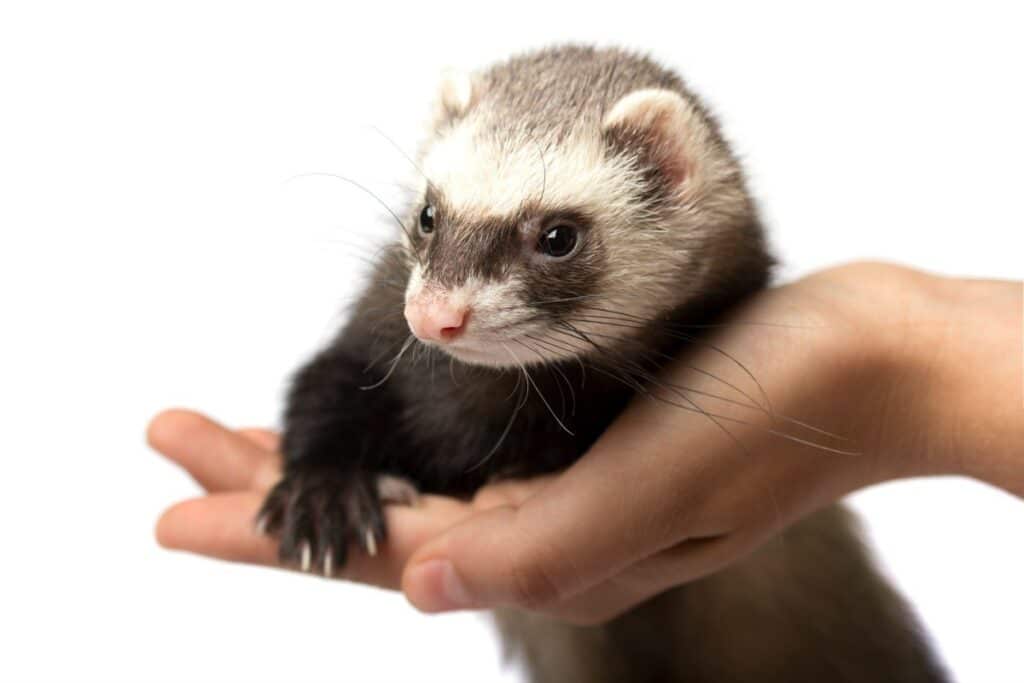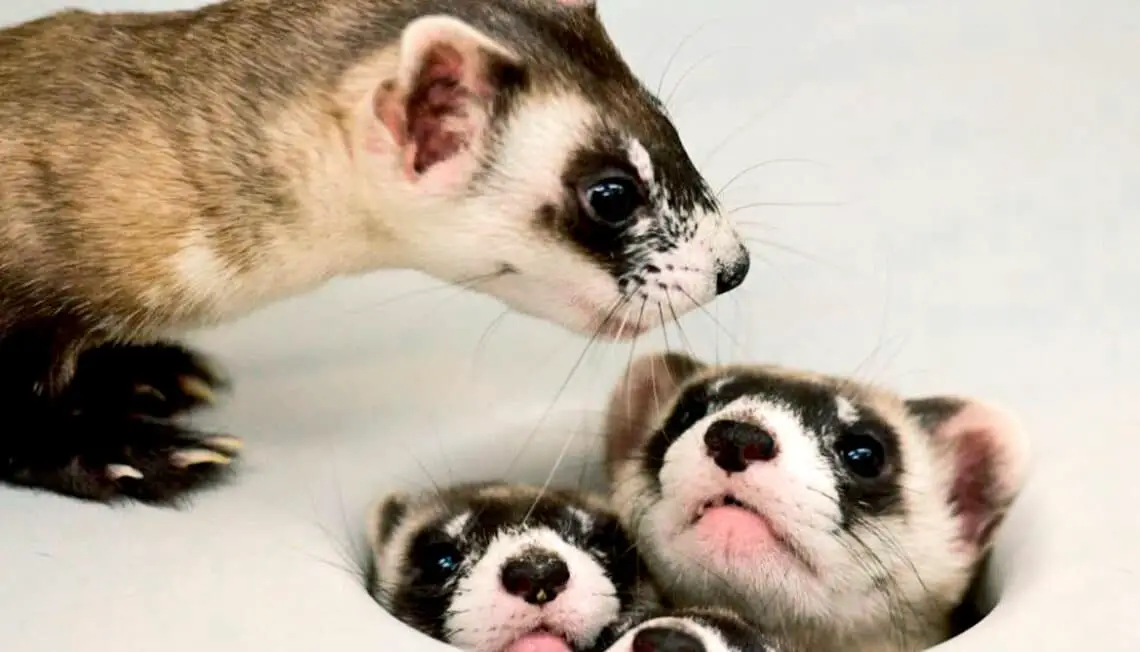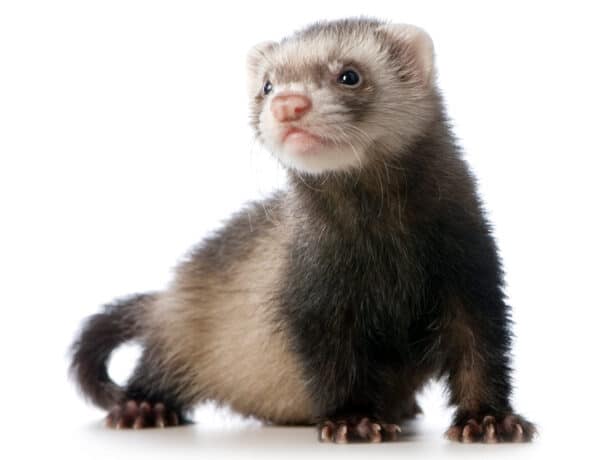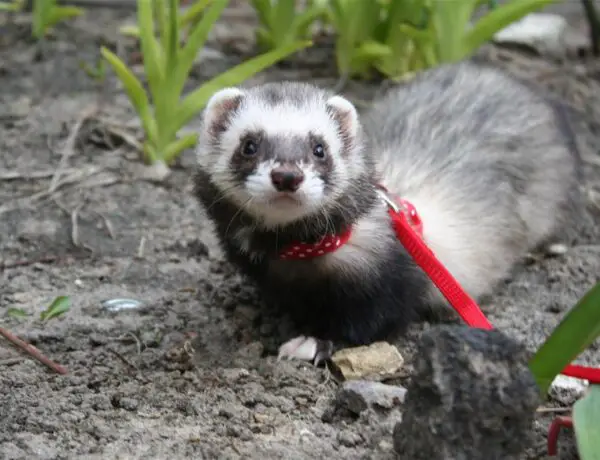Introduction
Are Ferrets Aggressive: Ferrets, those charming and inquisitive small mammals, have captivated the hearts of many pet enthusiasts with their playful antics and mischievous personalities. However, there’s a common misconception that ferrets are inherently aggressive creatures. In reality, the temperament of a ferrets dark can vary significantly depending on various factors, including genetics, socialization, and individual personality. This article delves into the fascinating world of ferret behavior, exploring the question of whether ferrets are truly aggressive or if there’s more to their complex nature than meets the eye. By understanding the intricacies of ferret behavior, prospective and current ferret owners can better appreciate and care for these delightful pets.
In the realm of exotic pets, ferrets hold a special place due to their unique blend of charm and curiosity. These pint-sized carnivores, belonging to the Mustelidae family, share a lineage with weasels, otters, and badgers. However, their small stature, sleek coats, and distinctive markings have made them popular companions for people around the world. One of the most common misconceptions about ferrets is that they are inherently aggressive. While they do possess certain instincts that can be perceived as aggressive behaviors, such as nipping and hissing, it’s essential to delve deeper into their natural disposition and the factors that influence their temperament.
Ferrets are not naturally aggressive in the sense that they actively seek to harm humans or other animals. Instead, their behavior is shaped by a combination of genetic predisposition, early life experiences, and the environment in which they are raised. Factors like socialization, training, and the presence of other pets in the household can significantly influence whether a ferret displays aggressive tendencies or becomes a gentle and sociable companion. In this article, we will explore the various facets of ferret behavior, shedding light on the reasons behind their occasional aggressive displays, as well as offering insights into how to properly care for and train these captivating creatures.

Do ferrets bite hard?
Nibbles and nips are often playful or accidental and usually do not leave a mark on the skin. The deliberate, hard bite, which typically results in a puncture wound, is a much more serious situation. A ferret might bite for many reasons, but most biting behavior falls under one of these two general headings.
Ferrets are naturally playful animals, and like many young animals, they explore their world and interact with others using their mouths. Playful biting is common in ferret kits (young ferrets) as they engage in social play and learn about their environment. This type of biting is generally gentle and more of a nibbling nature.
Ferrets communicate with each other through various vocalizations and body language. Sometimes, biting can be a form of communication for ferrets. They may bite to get your attention or express excitement. These bites are usually not intended to harm but rather to convey a message.
Ferrets may bite when they feel threatened, scared, or stressed. In such situations, their bites can be more forceful and defensive as they try to protect themselves. Understanding and addressing the source of their fear or stress is crucial to prevent such biting incidents.
Just like puppies and kittens, ferrets go through a teething phase when their baby teeth fall out and adult teeth come in. During this time, they may experience discomfort and may chew or bite on objects, including fingers, to alleviate their discomfort.
Are ferrets calm or aggressive?
Most ferrets are loving animals so if you have a scared or aggressive ferret near you, there is something in his life that triggered it. Most ferrets that show any sign of fear are abused animals often found in shelters.
Ferrets are neither inherently calm nor overtly aggressive by nature. Instead, their disposition is influenced by various factors, including genetics, early life experiences, socialization, and the environment in which they are raised.
Ferrets are renowned for their playful and inquisitive personalities. They are curious by nature and thrive on exploration, which can often lead to boisterous play and enthusiastic interactions with their surroundings. This exuberance might be mistaken for aggression by those unfamiliar with ferret behavior. However, it’s essential to recognize that this playfulness is a vital part of their charm and is not indicative of aggression.
Ferrets have strong territorial instincts, which can manifest as defensive behaviors when they feel their space is being invaded. This can include hissing, growling, or even nipping. These actions are not necessarily aggressive in the malicious sense but rather a means of self-defense or asserting boundaries.
Ferrets are highly social animals that thrive on human interaction and companionship. When properly socialized and raised in a nurturing environment, ferrets tend to be affectionate, forming strong bonds with their owners. However, if they lack socialization or have negative experiences, they may become fearful or aggressive as a defense mechanism.
Are ferrets good pets?
Ferrets have become common household pets in the United States, and their curious and friendly nature makes them suitable pets for many. Ferret owners should be aware that although ferrets can make good pets, they can sometimes carry germs that can make people sick.
Playful Companionship: Ferrets are renowned for their playful and mischievous nature. They love to romp, explore, and engage in interactive play, making them entertaining and endearing companions.
Affectionate Bonds: With proper socialization and care, ferrets form strong bonds with their human caregivers. Their affectionate nature can lead to a deep and rewarding connection between ferrets and their owners.
Low Maintenance Grooming: Ferrets have short, sleek coats and are fastidious groomers themselves, requiring minimal grooming assistance. Regular nail trimming and the occasional bath are typically all that’s needed to keep them clean and healthy.
Compact Size: Ferrets are small in size, making them suitable for people with limited living space. They don’t require large enclosures like some other pets.
Longevity: With proper care, ferrets can live for 6 to 10 years or even longer. This provides the opportunity for a lasting and fulfilling relationship with your furry friend.
Do ferrets smell bad?
The natural musky odor of ferrets comes from their scent glands (most notably the anal glands) and is used for territorial marking. Most commercially available ferrets in the United States are “de-scented,” which means that they have gone through a surgical procedure to remove their anal glands.
Ferrets are delightful and playful pets known for their inquisitive nature and charming personalities. However, there’s a common misconception that ferrets have a strong and unpleasant odor. In this article, we’ll explore the reality behind the “ferret smell” and provide tips on managing and minimizing any potential odors associated with ferret ownership.
It’s essential to clarify that ferrets themselves are not inherently smelly animals. What gives ferrets their reputation for having a distinct odor is the scent glands located near their anus, which produce a musky secretion. This scent is a natural defense mechanism and a form of communication used by ferrets to mark their territory and identify one another.
With proper care, hygiene, and attention to their diet, you can minimize and even prevent strong ferret odors. The key is to stay on top of cleanliness and provide your furry friend with a healthy diet and a loving, comfortable environment. Ferrets can make wonderful pets, and their playful personalities often outweigh any mild scent they may have.
Are ferrets good pets for kids?
Lively, curious and fun-loving ferrets make great pets, but they’re not the easiest to handle and can bite if startled, so, they don’t always make good pets for children. Like all pets, ferrets require more looking after than a child can offer and responsibility for any animal’s wellbeing lies with adults.
Ferrets are captivating little creatures with their playful antics and curious nature, often sparking interest among children as potential pets. However, the question of whether ferrets make good pets for kids is a nuanced one that depends on various factors. In this article, we’ll explore the pros and cons of ferret ownership in family settings, helping parents and caregivers make informed decisions about bringing ferrets into their homes.
Always supervise interactions between children and ferrets to prevent accidental harm to either party. Teach children about proper ferret care, hygiene, and handling to minimize the risk of bites or scratches. Be aware of any allergies within your household, and consider allergy testing before bringing a ferret home. Ferret ownership should be a family commitment, with parents ultimately responsible for the care of the pet.
Ferrets can indeed be wonderful pets in family settings, but they require careful consideration, commitment, and supervision when children are involved. Responsible ferret ownership involves educating both children and adults about the unique needs of these animals and ensuring a safe and nurturing environment for all. With proper guidance and care, ferrets can provide valuable lessons and companionship to children, creating cherished memories that last a lifetime.
What is a ferret kiss?
Kissing. Just as in humans, your ferret kissing you on the lips can be a sign of affection. It can also mean that your ferret likes the flavor of your lip balm or of the turkey sandwich that you had for lunch.
Ferrets are renowned for their charming and playful personalities, and their interactions with their human caregivers can be truly heartwarming. One of the endearing behaviors exhibited by ferrets is what enthusiasts often refer to as a “ferret kiss.” In this article, we’ll explore what a ferret kiss is, why ferrets engage in this behavior, and how it’s interpreted in the world of ferret communication.
A ferret kiss is not a traditional kiss as humans understand it, involving lips meeting lips. Instead, it’s a special and intimate form of interaction between ferrets and their human companions. When a ferret engages in a “kiss,” they typically approach your face, nuzzle it gently, and may even nibble or lick you. This behavior can be a heartwarming expression of affection from your furry friend.
Ferrets are highly social creatures and use physical contact to bond with their fellow ferrets and, in the case of domesticated ferrets, with their human caregivers. The act of “kissing” is a way for ferrets to communicate their feelings, including affection and trust. When a ferret gives you a kiss, it’s often interpreted as a sign of their attachment to you.
Are ferrets loyal pets?
A pet ferret can be one of the most loyal, cuddly, and loving pets available but could also be one of the most finicky. With a shorter lifespan of just 8 to 10 years, it is recommended that ferrets be spayed or neutered to prevent major health risks that would shorten their lives even more.
Ferrets, those charming and playful members of the Mustelidae family, often steal the hearts of their human caregivers with their endearing personalities and mischievous antics. But the question of whether ferrets are loyal pets is one that requires a closer look into their behavior and the nature of their relationships with their owners. In this article, we’ll explore the concept of loyalty in ferrets and the ways in which they express their affection and attachment.
Ferrets are social animals by nature, and they have the capacity to form strong bonds with their human caregivers. While their loyalty may not be the same as that of a dog, ferrets do exhibit attachment and affection in their own unique ways.
Ferrets often show their attachment through physical gestures such as nuzzling, licking, and nibbling. These actions are expressions of trust and affection. Loyal ferrets seek out interaction with their owners. They may follow you around the house, play with you, or simply enjoy being near you.
Do ferrets love owners?
While ferrets are not for everyone, they can make great pets for the right owner. They are affectionate and bond with their owners, quiet for a large part of the day, and there are few pets as playful as ferrets.
Ferrets are undeniably affectionate animals, and they can form strong bonds with their human caregivers. However, their expression of love and attachment differs from that of more traditional pets like dogs and cats.
Ferrets often show their affection through physical gestures. They may nuzzle, lick, nibble, or gently paw at their owners. These actions are clear expressions of trust and fondness. Affectionate ferrets actively seek out interaction with their owners. They may follow you around the house, initiate play, or simply enjoy being in your presence.
The bond between a ferret and its owner is a unique and special one. While ferrets may not express love in the same way dogs or cats do, their affectionate behaviors and their trust in their owners are clear indicators of a meaningful connection.

Conclusion
In the realm of pet ownership, understanding and demystifying the question of whether ferrets are aggressive is essential for fostering a harmonious relationship with these intriguing creatures. Through our exploration of ferret behavior, it becomes evident that labeling ferrets as inherently ferrets aggressive oversimplifies their complex nature. Ferrets are not naturally hostile animals; instead, their behavior is influenced by a variety of factors, including genetics, upbringing, socialization, and environment. Ferrets, with their playful and inquisitive personalities, have charmed their way into the hearts of many enthusiasts. While they may exhibit behaviors that can be interpreted as aggression, such as nipping, hissing, or territoriality, it’s crucial to recognize these actions as part of their innate instincts and communication methods.
With proper care, training, and socialization, ferrets can develop into friendly and affectionate companions. Ultimately, the key to a successful relationship with a ferret lies in responsible ownership. Providing a stimulating environment, positive social interactions, and patience during their developmental stages can help mitigate any potential aggressive tendencies. As with any pet, understanding and respecting their unique traits and behaviors is fundamental to ensuring a happy and fulfilling life for both the ferret and their human companions. Beyond their occasional displays of aggression, ferrets offer a world of joy and entertainment to those who choose to make them part of their families. Their energetic playfulness, mischievous antics, and endearing social interactions are just some of the qualities that make them such beloved pets.
To ensure a positive experience with ferret ownership, it’s essential for prospective or current ferret owners to educate themselves on their pets’ unique needs and behaviors. Providing ample opportunities for physical activity, mental stimulation, and social interaction is vital for keeping ferrets happy and reducing the likelihood of aggressive behaviors. Moreover, regular vet check-ups, proper nutrition, and maintaining a clean and safe living environment are all essential components of responsible ferret ownership. These measures not only promote the physical health of your ferret but also contribute to their overall well-being and contentment.





No Comments